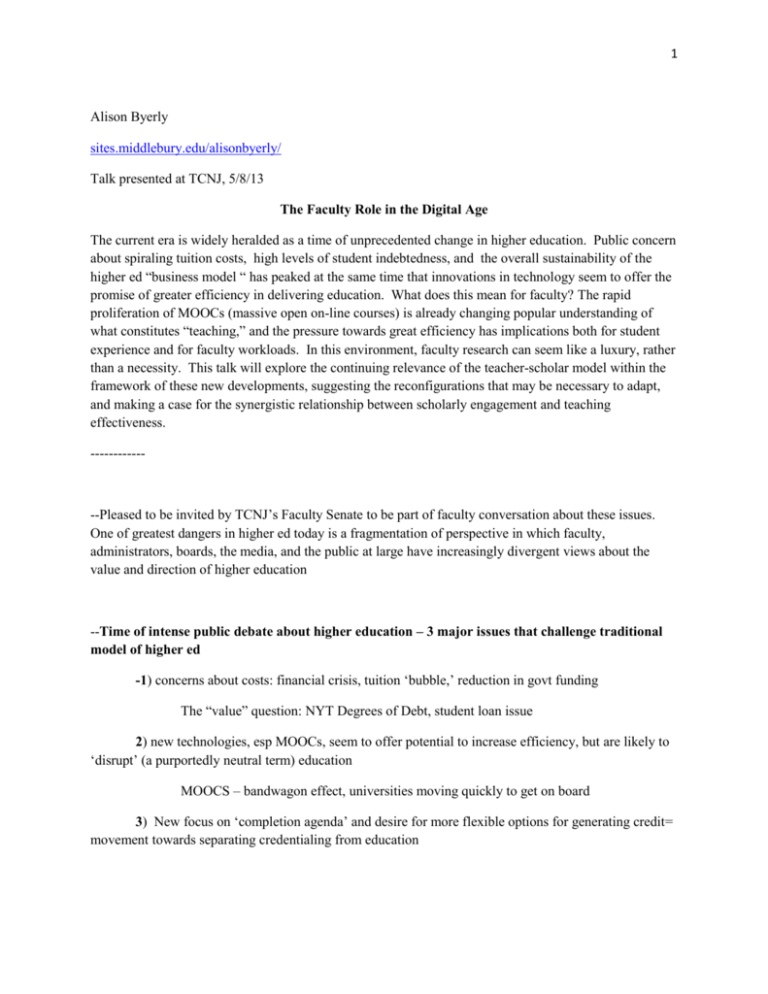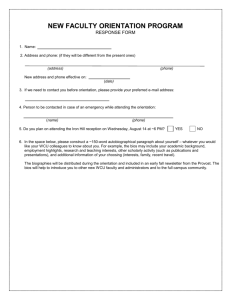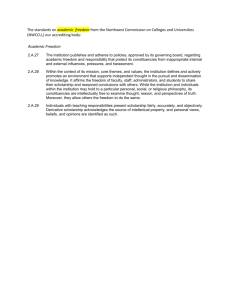Faculty Role in the Digital Age
advertisement

1 Alison Byerly sites.middlebury.edu/alisonbyerly/ Talk presented at TCNJ, 5/8/13 The Faculty Role in the Digital Age The current era is widely heralded as a time of unprecedented change in higher education. Public concern about spiraling tuition costs, high levels of student indebtedness, and the overall sustainability of the higher ed “business model “ has peaked at the same time that innovations in technology seem to offer the promise of greater efficiency in delivering education. What does this mean for faculty? The rapid proliferation of MOOCs (massive open on-line courses) is already changing popular understanding of what constitutes “teaching,” and the pressure towards great efficiency has implications both for student experience and for faculty workloads. In this environment, faculty research can seem like a luxury, rather than a necessity. This talk will explore the continuing relevance of the teacher-scholar model within the framework of these new developments, suggesting the reconfigurations that may be necessary to adapt, and making a case for the synergistic relationship between scholarly engagement and teaching effectiveness. ------------ --Pleased to be invited by TCNJ’s Faculty Senate to be part of faculty conversation about these issues. One of greatest dangers in higher ed today is a fragmentation of perspective in which faculty, administrators, boards, the media, and the public at large have increasingly divergent views about the value and direction of higher education --Time of intense public debate about higher education – 3 major issues that challenge traditional model of higher ed -1) concerns about costs: financial crisis, tuition ‘bubble,’ reduction in govt funding The “value” question: NYT Degrees of Debt, student loan issue 2) new technologies, esp MOOCs, seem to offer potential to increase efficiency, but are likely to ‘disrupt’ (a purportedly neutral term) education MOOCS – bandwagon effect, universities moving quickly to get on board 3) New focus on ‘completion agenda’ and desire for more flexible options for generating credit= movement towards separating credentialing from education 2 -- Concerns about viability of higher ed as ‘industry,’ –comparison with music industry or publishing. -The ‘unbundling’ of different strands has the effect of cutting out the middle man, the processor of information, allowing consumers to go directly to content. -in all of these areas, ‘expertise’ (or hierarchy) is dismantled (or democratized, depending on how you look at it) --This public discourse is leading to rapid changes in perceptions of what “education” is, what “college” is Even the terminology is changing (my IHE piece): traditionally, “teacher” is a role that carries certain obligations towards a mutual relationship. “Student” means a learner committed to a formal course of study, with agreed-upon goals -a “course,” whether in person or online, involves defined goals and mutual committment --recent movements to establish in CA and FLA “universities” that “provide no instruction” challenge our understanding of the term “university.” --Academia is seen as antithetical, even hostile, to “innovation” Tweet from @audreywatters: “edtech ‘innovation’ means doing without contributions from educators, theorists, scholars” : -Innovation championed by books like DIY U, Hacking the Academy, Clayton Christenson’s the Innovative University, Selingo’s College Unbound Even more influential: newspaper articles about academy’s unwillingness to confront issues. e.g., Tom Friedman on MOOCs --But some academics are trying to theorize and support innovation -in arena of teaching, Cathy Davidson, founder of HASTAC and author of Now You See It: How the Brain Science of Attention is Transforming the Way we Live, Work, and Learn -“if we can be replaced by computers, we should be” – challenges us to respond -in area of publishing/scholarship, Kathleen Fitzpatrick, Planned Obsolescence: a brilliant exposition of the way in which scholarly publication is changing, and must change, as a result of new modes of scholarly communication 3 --Faculty risk being sidelined or rendered irrelevant -on one hand, UVA; recent Chronicle article noting faculty votes of no confidence are increasingly ignored -on the other hand, Amherst, Duke, San Jose rejected MOOCs – somewhat reactionary move *Both approaches are problematic ** We cannot avoid re- examining a basic premise: What is the faculty role? In teaching, scholarship, governance? -In arena of teaching, the ‘adjunctification’ of labor and rapid proliferation of ‘faculty-free’ models suggest a need to reinforce basic dimensions of teaching—mentoring, individual responsiveness, ongoing guidance—that we have taken for granted. -the general trend is to separate different elements of faculty role, professionalize each one independently. This ‘unbundling’ of the faculty role is a premonition of the unbundling of the university -Need to make a case for the continuing relevance of teacher-scholar model -what is teacher-scholar? The term is like “student-athlete;” it’s a hybrid that expresses doubt about ability to balance both -TCNJ’s own task force, ACLS report: an active scholar whose teaching is informed by their own scholarly engagement: -it’s partly a case for expertise, at a time when expertise is increasingly discredited What is the argument for teacher-scholars, rather than teachers and scholars working separately? -(1) research ensures that teaching keeps pace with field -(2) faculty as models of research: teaching students how to master something, how to go beyond an introductory understanding to arrive at a level where truly independent discovery is possible -that should resonate with interest in creativity, innovation, entrepreneurship -be more explicit about that modeling: co-author papers, take students to conferences, esp in liberal arts disciplines -emphasize student independence 4 Adaptation necessary -Define goals not in terms of faculty identity, but in terms of student impact : consider replacing teacher-scholar with ‘engaged teacher,’ etc -emphasize importance of modeling intellectual inquiry and passion -be willing to examine your pedagogy: define teachers as guides, mentors, rather than instructors: need to be innovative, more responsive to student interest to some degree Most curricula designed around faculty interests, not student needs: find right balance **Solution: greater INTEGRATION of teaching, scholarship, and service We treat them as entirely separate categories within our reward structures: and yet most interesting work is a blend: teaching informed by research, ‘public scholarship,’ service that draws on a scholar’s area of expertise and teaching This makes it easier to ‘unbundle’ them Faculty need to: Be open to innovation Recognize need for student-centered discourse Not be defensive in the face of higher prioritization of teaching Not be defensive about efforts to link curriculum with practical and pre-professional goals Develop curricula that are more flexible, adaptable Ensure that promotion/tenure standards reward public scholarship, digital scholarship, and other emerging areas **In the current environment, maintaining the status quo is not an option. The choices are: change, or be changed.









